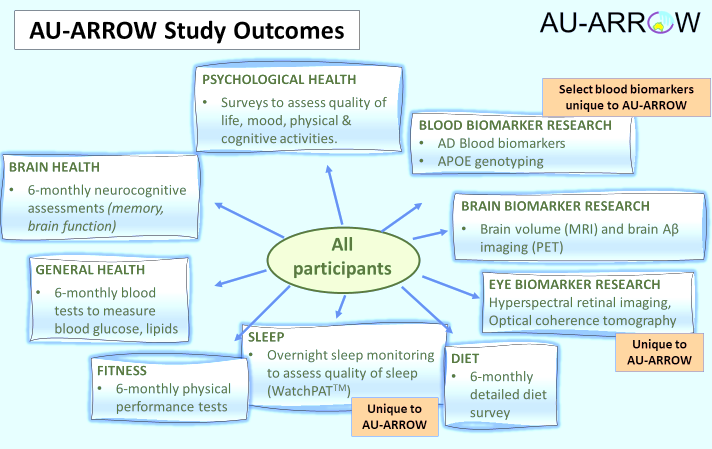
A recent study in Finland[1] – the Finnish Geriatric Intervention Study to Prevent Cognitive Impairment and Disability (FINGER) – has shown that lifestyle modifications that include adopting a healthy diet, carrying out regular aerobic and resistance physical exercise, staying socially active, and undergoing brain training exercises can improve brain function and reduce the risk of dementia.
These results have inspired a world-wide research initiative for dementia risk reduction known as World-Wide FINGERS (WW-FINGERS). Funded by a Medical Research Future Fund grant and US Alzheimer’s Association funding – Australia has joined this initiative and will run the AUstralian multidomain Approach to Reduce dementia Risk by prOtecting brain health With lifestyle intervention study (AU-ARROW) over a period of five years. The study will be carried out through Macquarie University in Sydney and the Edith Cowan University and the Australian Alzheimer’s Research Foundation in Perth. ADNeT will assist in the recruiting and screening of participants.
The study will involve 600 people aged 60–79 (half in Sydney and half in Perth), who will be randomly allocated to one of two groups: a health education and coaching group (HC) or a structured, multidomain lifestyle intervention group (ML). Both groups will participate in group meetings with information sessions about exercise, diet and activities to keep mentally and socially active. The ML group will also receive additional support via regular phone calls, monthly group meetings, free gym membership, fitness tracker, medical and dietary counselling, recipes and free online brain training for the two years of the program.
All participants will be followed for 2 years, and will have study-specific blood testing, physical assessments and general clinical health monitoring, as well as 6-monthly comprehensive cognitive tests to assess a selection of brain function capabilities. Fasting blood samples collected every 12 months will be stored for studies of potential AD early diagnostic tests, as well as genetic tests to do with dementia. Participants will also be given the option to undergo brain scans related to memory and brain function, including scans that can detect brain amyloid plaque build-up, as well as specialised retinal imaging scans at the beginning and end of the study, to help with the development of simple, cost-effective and early eye diagnostic test. Funding is available for up to 50% of participants to undergo these scans.
We hope that the outcomes of this study will add to the evidence that lifestyle modifications can have a significant positive impact on cognitive decline and dementia risk. Ultimately, this knowledge will help develop a framework of preventative steps.
[1] The Finnish Geriatric Intervention Study to Prevent Cognitive Impairment and Disability (FINGER,ClinicalTrials.gov:NCT01041989), in Alzheimer’s & Dementia, 2020;1–17 (DOI: 10.1002/alz.12123)